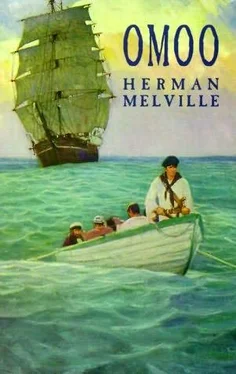Herman Melville - Omoo - Adventures in the South Seas
Здесь есть возможность читать онлайн «Herman Melville - Omoo - Adventures in the South Seas» весь текст электронной книги совершенно бесплатно (целиком полную версию без сокращений). В некоторых случаях можно слушать аудио, скачать через торрент в формате fb2 и присутствует краткое содержание. Жанр: Классическая проза, на английском языке. Описание произведения, (предисловие) а так же отзывы посетителей доступны на портале библиотеки ЛибКат.
- Название:Omoo: Adventures in the South Seas
- Автор:
- Жанр:
- Год:неизвестен
- ISBN:нет данных
- Рейтинг книги:3 / 5. Голосов: 1
-
Избранное:Добавить в избранное
- Отзывы:
-
Ваша оценка:
- 60
- 1
- 2
- 3
- 4
- 5
Omoo: Adventures in the South Seas: краткое содержание, описание и аннотация
Предлагаем к чтению аннотацию, описание, краткое содержание или предисловие (зависит от того, что написал сам автор книги «Omoo: Adventures in the South Seas»). Если вы не нашли необходимую информацию о книге — напишите в комментариях, мы постараемся отыскать её.
Omoo: Adventures in the South Seas — читать онлайн бесплатно полную книгу (весь текст) целиком
Ниже представлен текст книги, разбитый по страницам. Система сохранения места последней прочитанной страницы, позволяет с удобством читать онлайн бесплатно книгу «Omoo: Adventures in the South Seas», без необходимости каждый раз заново искать на чём Вы остановились. Поставьте закладку, и сможете в любой момент перейти на страницу, на которой закончили чтение.
Интервал:
Закладка:
In the same way, the "Opio," or festive harvest-home of the breadfruit, has been suppressed; though, as described to me by Captain Bob, it seemed wholly free from any immoral tendency. Against tattooing, of any kind, there is a severe law.
That this abolition of their national amusements and customs was not willingly acquiesced in, is shown in the frequent violation of many of the statutes inhibiting them; and, especially, in the frequency with which their "hevars," or dances, are practised in secret.
Doubtless, in thus denationalizing the Tahitians, as it were, the missionaries were prompted by a sincere desire for good; but the effect has been lamentable. Supplied with no amusements in place of those forbidden, the Tahitians, who require more recreation than other people, have sunk into a listlessness, or indulge in sensualities, a hundred times more pernicious than all the games ever celebrated in the Temple of Tanee.
CHAPTER XLVIII
TAHITI AS IT IS
AS IN the last few chapters, several matters connected with the general condition of the natives have been incidentally touched upon, it may be well not to leave so important a subject in a state calculated to convey erroneous impressions. Let us bestow upon it, therefore, something more than a mere cursory glance.
But in the first place, let it be distinctly understood that, in all I have to say upon this subject, both here and elsewhere, I mean no harm to the missionaries nor their cause; I merely desire to set forth things as they actually exist.
Of the results which have flowed from the intercourse of foreigners with the Polynesians, including the attempts to civilize and Christianize them by the missionaries, Tahiti, on many accounts, is obviously the fairest practical example. Indeed, it may now be asserted that the experiment of Christianizing the Tahitians, and improving their social condition by the introduction of foreign customs, has been fully tried. The present generation have grown up under the auspices of their religious instructors. And although it may be urged that the labours of the latter have at times been more or less obstructed by unprincipled foreigners, still, this in no wise renders Tahiti any the less a fair illustration; for, with obstacles like these, the missionaries in Polynesia must always, and everywhere struggle.
Nearly sixty years have elapsed since the Tahitian mission was started; and, during this period, it has received the unceasing prayers and contributions of its friends abroad. Nor has any enterprise of the kind called forth more devotion on the part of those directly employed in it.
It matters not that the earlier labourers in the work, although strictly conscientious, were, as a class, ignorant, and, in many cases, deplorably bigoted: such traits have, in some degree, characterized the pioneers of all faiths. And although in zeal and disinterestedness the missionaries now on the island are, perhaps, inferior to their predecessors, they have, nevertheless, in their own way at least, laboured hard to make a Christian people of their charge.
Let us now glance at the most obvious changes wrought in their condition.
The entire system of idolatry has been done away; together with several barbarous practices engrafted thereon. But this result is not so much to be ascribed to the missionaries, as to the civilizing effects of a long and constant intercourse with whites of all nations; to whom, for many years, Tahiti has been one of the principal places of resort in the South Seas. At the Sandwich Islands, the potent institution of the Taboo, together with the entire paganism of the land, was utterly abolished by a voluntary act of the natives some time previous to the arrival of the first missionaries among them.
The next most striking change in the Tahitians is this. From the permanent residence among them of influential and respectable foreigners, as well as from the frequent visits of ships-of-war, recognizing the nationality of the island, its inhabitants are no longer deemed fit subjects for the atrocities practised upon mere savages; and hence, secure from retaliation, vessels of all kinds now enter their harbours with perfect safety.
But let us consider what results are directly ascribable to the missionaries alone.
In all cases, they have striven hard to mitigate the evils resulting from the commerce with the whites in general. Such attempts, however, have been rather injudicious, and often ineffectual: in truth, a barrier almost insurmountable is presented in the dispositions of the people themselves. Still, in this respect, the morality of the islanders is, upon the whole, improved by the presence of the missionaries.
But the greatest achievement of the latter, and one which in itself is most hopeful and gratifying, is that they have translated the entire Bible into the language of the island; and I have myself known several who were able to read it with facility. They have also established churches, and schools for both children and adults; the latter, I regret to say, are now much neglected: which must be ascribed, in a great measure, to the disorders growing out of the proceedings of the French.
It were unnecessary here to enter diffusely into matters connected with the internal government of the Tahitian churches and schools. Nor, upon this head, is my information copious enough to warrant me in presenting details. But we do not need them. We are merely considering general results, as made apparent in the moral and religious condition of the island at large.
Upon a subject like this, however, it would be altogether too assuming for a single individual to decide; and so, in place of my own random observations, which may be found elsewhere, I will here present those of several known authors, made under various circumstances, at different periods, and down to a comparative late date. A few very brief extracts will enable the reader to mark for himself what progressive improvement, if any, has taken place.
Nor must it be overlooked that, of these authorities, the two first in order are largely quoted by the Right Reverend M. Kussell, in a work composed for the express purpose of imparting information on the subject of Christian missions in Polynesia. And he frankly acknowledges, moreover, that they are such as "cannot fail to have great weight with the public."
After alluding to the manifold evils entailed upon the natives by foreigners, and their singularly inert condition; and after somewhat too severely denouncing the undeniable errors of the mission, Kotzebue, the Russian navigator, says, "A religion like this, which forbids every innocent pleasure, and cramps or annihilates every mental power, is a libel on the divine founder of Christianity. It is true that the religion of the missionaries has, with a great deal of evil, effected some good. It has restrained the vices of theft and incontinence; but it has given birth to ignorance, hypocrisy, and a hatred of all other modes of faith, which was once foreign to the open and benevolent character of the Tahitian."
Captain Beechy says that, while at Tahiti, he saw scenes "which must have convinced the great sceptic of the thoroughly immoral condition of the people, and which would force him to conclude, as Turnbull did, many years previous, that their intercourse with the Europeans had tended to debase, rather than exalt their condition."
About the year 1834, Daniel Wheeler, an honest-hearted Quaker, prompted by motives of the purest philanthropy, visited, in a vessel of his own, most of the missionary settlements in the South Seas. He remained some time at Tahiti; receiving the hospitalities of the missionaries there, and, from time to time, exhorting the natives.
After bewailing their social condition, he frankly says of their religious state, "Certainly, appearances are unpromising; and however unwilling to adopt such a conclusion, there is reason to apprehend that Christian principle is a great rarity."
Читать дальшеИнтервал:
Закладка:
Похожие книги на «Omoo: Adventures in the South Seas»
Представляем Вашему вниманию похожие книги на «Omoo: Adventures in the South Seas» списком для выбора. Мы отобрали схожую по названию и смыслу литературу в надежде предоставить читателям больше вариантов отыскать новые, интересные, ещё непрочитанные произведения.
Обсуждение, отзывы о книге «Omoo: Adventures in the South Seas» и просто собственные мнения читателей. Оставьте ваши комментарии, напишите, что Вы думаете о произведении, его смысле или главных героях. Укажите что конкретно понравилось, а что нет, и почему Вы так считаете.












